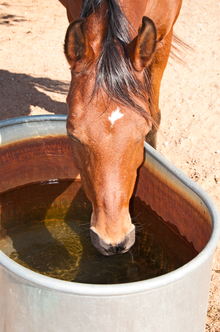The Sonoma County Horse Council has released a report concerning the addition of fluoride to the area's water supply. According to Ted S Stashak DVM, MS, Diplomate ACVS, "Some concern has recently been voiced by horse owners regarding the fact that the Sonoma County Board of Supervisors is considering adding fluoride (F) to our water supply, and the effect this may have on horses in the county."

Research on effects of floridated water on horses
Peer-reviewed literature in scientific journals, to date, showed no published reports documenting fluorosis in horses due to ingestion of fluoridated public water alone.
"To become better informed about the possible negative effects of AFW on horses, a literature search over the past 30 years was done. Additionally an internal medicine specialist and toxicologist at UCD, and a pathologist specializing in bone pathology at Colorado State University were consulted. The following is a summary of the findings from these sources."
Summary:
In 1974 the US National Academy of Sciences established a dry weight dietary fluoride tolerance of 60 ppm F for horses. Since then two reports (2006 and 2008) identifying chronic fluorosis in a separate groups of horses, in Pagosa Springs CO and Hitchcock TX, drinking AFW at a concentration <1.3 ppm F, have been published.
Both articles describe a long period of exposure to AFW, without contamination from other F sources, and classical signs and laboratory evidence of F toxicity. No soil or water testing or assays for other F sources was reported in either study. Peer-reviewed literature in scientific journals, to date, showed no published reports documenting fluorosis in horses due to ingestion of fluoridated public water alone.
Discussion:
The 2006 and 2008 reports were published in a non-peer reviewed journal and are missing important information necessary to confirm that AFW alone was the cause for the signs of chronic fluorosis in these horses. Fluoride being one of the most common elements in the environment is found in soil, rock, water, air and plants. No soil, water or feed testing was reported in these articles.
While the horseâs symptoms improved following discontinuation of drinking the AFW; the authors did not rule out the exposure to other sources of F (e.g. use of fluoride-containing pesticides, fluoride-containing rodenticides, insecticides, and other chemicals etc.), which when added to the ppm in the AFW could have resulted in toxic levels
Conclusions:
Evidence to date indicates that F concentrations allowable in US public water systems are well tolerated by horses and do not cause fluorosis. Supporting this, is a fact that many horses nationwide drink AFW as their major source of water and fluorosis is a very rarely reported condition.
Post by Ted S Stashak DVM, MS, Diplomate ACVS
